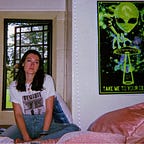You Have to Stop Hating Astrology: Putting Our Faith in Stardust
Despite the criticisms generally aimed at astrology, the practice has skyrocketed to mainstream popularity with the rise of apps like co-star and the Pattern. Yet, many still consider horoscopes, astrological analysis, and the general zodiac as tools for teenage girls to predict their love lives or a means for women in mid-life crises to explain their failures. The question of “what’s your sign?” is often met with an eye-roll even in 2020, when several national polls estimate nearly a third of the United States believes in astrology in some capacity. The feminization of astrology undoubtedly contributes to its being seen as a “joke.”
People love to invalidate and shame traditionally feminine practices and “obsessions” in the mainstream media. Consider Justin Bieber and One Direction, two staple acts of the mid-2000s that were senselessly bullied by the general population (particularly middle-aged men) and critics alike. Bieber’s music video for “Baby” was the most disliked YouTube for multiple years and countless demeaning jabs were, and still are, thrown at the British band. Yet, a fanbase of teenage girls kept all singers afloat and their pockets filled for years throughout the apexes of their respective careers. The same group of girls shamed by their peers and the media for their silly obsession revolutionized the music industry and created mega-stars.
People often point to magazine horoscopes, such as those in Cosmopolitan, to justify their disbelief in the value of astrology. This frequent criticism, and one which is rightfully doubted, is based on the oversimplification of the practice. A journalist scribing a one-page column assigning each of the twelve signs a particular toil and triumph for the week does so for consumption, not for accuracy. A deeper understanding of astrology shows us that one is much more than the Sun sign which is often seen as the end all be all of astrological identity. For this reason, apps like co-star have succeeded as they attempt to breakdown a user’s personal “birth chart,” the positioning of various planets and constellations at one’s time and place of birth, to better understand their identity and predict their future. Cosmo and co-star serve similar purposes, and both operate with various levels of inaccuracies, but the latter more transparently attempts to showcase the multiplicity of astrology as more than just “being a Scorpio.”
We need to stop demonizing another harmless practice that attempts to explain the altogether fascinating and devastating nature of the real world. We live in unprecedented times and sometimes, it’s easier to pretend that society is falling apart because four planets are in retrograde, not because of humanity’s own errors. If we can argue for the existence of an invisible God playing the Sims with our little mortal lives, there’s room for conversation about the impact of planetary movement on our societal patterns. It is not revolutionary to invent new ways of intaking and processing the historical events we live through. In fact, astrology has been predicting and justifying history since 2,000 BC. The popular astrology of today, however, is a Westernized daughter, and mere shadow, of its Eastern roots. Prior to its role as a faux means of psychoanalysis, astrology was used for predicting the most auspicious times to bear children, go to war, or other major decisions.
Astrology’s particular value to me is in its current status as a pseudo-psychological science. Analyzing my birth chart is a cheaper means of therapy than prying into my soul with a psychologist. Specific planetary positions within my chart allow me to explain my strengths and weaknesses or fears and desires with ease. I can explain my identity to you more easily in a few bite-sized pieces about stars than I can in attempting to piece together my entire life story in anecdotal evidence. My sun, Mercury, and Venus all fall in Pisces, meaning that I’m incredibly emotional, sensitive, unrealistic, and can’t communicate to save my life. My moon, the planet which guides one’s emotions, is in its ruling sign of Cancer which makes me all the more riddled with sensibility, nostalgia, and sentimentality. These watery placements also fuel my creativity and arguably could explain my very interest in astrology. My Taurus rising, the sign which you “present” as to the average person, stabilizes me to some capacity, but this is immediately offset by my Mars in Aries. Mars, also ruled by Aries, is the planet of passions and explains why I throw myself into details and fleeting fits of interest in hobbies, humans, and the like, only to burn out almost immediately after. Simple explanations such as the degree of a planet when I was born telling me the way I’m able to handle interpersonal relationships gives me a sense of assurance provided by nothing else. The stars can tell me whatever I need them to.
A belief in astrology can be a blanket of comfort. It can provide the answers in a time where no answers feel quite right. If we can allow our society to base its constitutional values in the idea of an invisible man pulling strings and assigning blame, we can accept that some people prefer to believe in the universe rather than an omnipresent force. We can no longer negate the value of the stars when they’ve caused us no harm. There are more dangerous battles to fight than finding faith in stardust.
